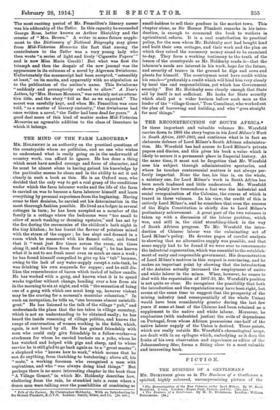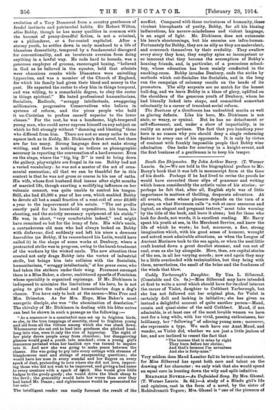FICTION.
THE BUSINESS OF A GENTLEHAILt Drcgrwsorr gives us in The Business of a Gentleman a spirited, highly coloured, uncompromising picture of the 6-The Resesetrtselien of the Nap Colonies under Lord Milner. By W. Emil Worsfold. 2 vol. London Keg. Paul, Trench, and Co. [25a. not.1 t The Rusinms of a Guthman. By H. N. Dickineon. Londoa: William Heineman. [es.] evolution of a Tory Democrat from a country gentleman of feudal instincts and patriarchal habits. Sir Robert Wilton, alias Bobby, though he has many qualities in common with the baronet of penny-dreadful fiction, is not a criminal, or a philanderer, or a fur-coated capitalist. After a stormy youth, be settles down in early manhood to a life of blameless domesticity, tempered by a fundamental disregard for conventionality, and an inveterate aversion from doing anything in a lawful way. He rode hard to hounds, was a generous employer of grooms, encouraged boxing, "believed in God as be believed in the equator, held that atheists were obnoxious cranks while Dissenters were snivelling hypocrites, and was a member of the Church of England, for which his family had given their blood and money in the past. He expected the rector to obey him in things temporal, and was willing, to a remarkable degree, to obey the rector in things spiritual." He hated professional humanitarians, Socialists, Radicals, "scraggy intellectuals, swaggering millionaires, progressive Conservatives who believe in systems of reform, and the pious people who hold it un-Christian to profess oneself superior to the lower classes." For the rest, he was a handsome, high-tempered young man, who could never express himself on any subject on which he felt strongly without " damning and blasting" those who differed from him. There are not so many oaths to the square inch as in Keddy, Mr. Dickinson's first novel, but there are far too many. Strong language does not make strong writing, and there is nothing so tedious as phonographic accuracy in reporting the conversation of a bard swearer. Even on the stage, where the " big, big D" is used to bring down the gallery, playwrights are frugal in its use. Bobby had not a varied vocabulary: he was not a master of the art of orna- mental execration; all that we can be thankful for in this context is that he was not gross or coarse in his use of oaths. His wife, whose first husband died insane after eight months of married life, though exerting a mollifying influence on her volcanic consort, was quite unable to control his tongue. Still, she bad £5,000 a year of her own, which enabled Bobby to devote all but a small fraction of a rent-roll of over £6,000 a year to the improvement of his estate. "The net profits exactly paid for his household expenditure, his taxes, his shooting, and the strictly necessary equipment of his stable." He was, in short, "rely comfortable indeed," and might have remained no but for the irony of fate. His wife's uncle, a cantankerous old man who had always looked on Bobby with disfavour, died suddenly and left his niece a dainnosa haereditas (as Bobby, if he remembered his Latin, would have called it) in the shape of some works at Denbury, where a protracted strike was in progress, owing to the harsh treatment of the workers by the wicked uncle. The new situation thus created not only drags Bobby into the vortex of industrial strife, but brings him into collision with the Socialists, humanitarians, " scraggy intellectuals," et hoe genus swine, who bad taken the strikers under their wing. Foremost amongst them is a Mies Baker, a clever, embittered apostle of Feminism whose speciality is organized espionage. If Mr. Dickinson is indisposed to minimize the limitations of his hero, he is not going to give the radical and humanitarian dogs a dog's chance. You have only to look at the names—Mies Pree and Mrs. Brimeten. As for Mrs. Hope, Miss Baker's most energetic disciple, she was " the abomination of desolation." The chivalry of Mr. Dickinson in dealing with his bites noires can best be shown in such a passage as the following:— "As a scarecrow is a counterfeit man set up to frighten birds, so she, in the torn trappings of sanctity, stood to frighten young and old from all the virtues among which she was stuck down. Whomsoever she set out to lead into goodness she pitched head- long into vice, were it only the vice of hypocrisy. The sight of her piety drove people away from churches ; her disapproving glances would goad a youth into mischief; even a young. girl's Innocence perished when her basilisk eye was turned to inquire into it. And now she was going to make. peace between the classes. She was going to pry into every cottage with streams of blasphemous cant and strings of exasperating questions; she would have her nose in every scandal and her fingers on every speck of dust, pretending to love where she did not love, improv- ing those who did not wish to be improved, and giving a bad name to every creature with a spark of spirit. She would give little badges to the goody-goody; she would drive the black sheep to the devil ; the generality would hate her worse than ever they had hated Mr. Deane ; and righteousness would be persecuted for her sake."
The intelligent reader can easily forecast the_ result of the conflict. Compared with these caricatures of humanity, these. virulent bierophants of purity, Bobby, for all his blazing indiscretions, his narrow-mindedness and violent language, is an angel of light. Mr. Dickinson does not extenuate his hero's shortcomings, but his enemies are infra-human- Fortunately for Bobby, they are as silly as they are malevolent, and overreach themselves by their credulity. They swallow every story they hear, they employ spies so incompetent or so innocent that they become the accomplices of Bobby's. hoaxing friends, and, in particular, of .a precocious school. boy, whose education has been mainly conducted in the smoking-room. Bobby invades Danbury, ends the strike by methods which out-Socialise the Socialists, and in the long run the campaign of calumny recoils on the heads of its promoters. The silly serpents are no match for the honest bull-dog, and we leave Bobby in a blaze of glory, uplifted on the shoulders of the generous youth of Denbury, whom be- lled literally licked into shape, and committed somewhat reluctantly to a career of truculent social reform.
The Business of a Gentleman has undoubted merits as welt ae glaring defects. Like his hero, Mr. Dickinson is not stale, or weary, or cynical. But he has no detachment or self-effacement, and, under a show of impartiality, is in reality an acute partisan. The fact that you handicap your hero is no reason why you should deny a single redeeming feature to every one of his opponents. It is only by virtue of contrast with frankly impossible people that Bobby wine admiration One looks for courtesy in a knight-errant, and the first business of a gentleman is to keep his temper.















































 Previous page
Previous page